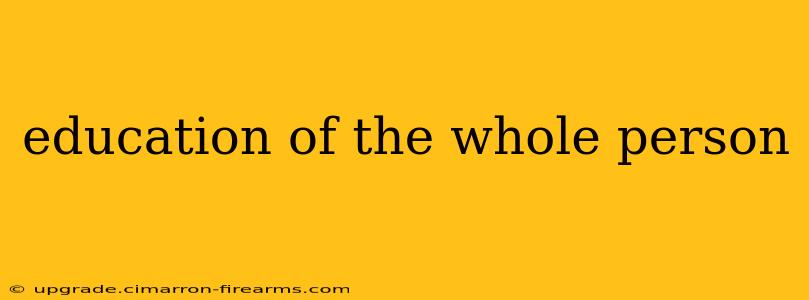The pursuit of a well-rounded education extends far beyond academic achievement. True education cultivates the whole person—mind, body, and spirit—fostering individuals capable of navigating the complexities of life with resilience, empathy, and a sense of purpose. This holistic approach recognizes that intellectual growth is inextricably linked to physical and emotional well-being, leading to a richer, more fulfilling life.
Beyond the Textbook: Nurturing the Mind
While academic excellence remains crucial, a holistic education emphasizes critical thinking, problem-solving, and creativity. This goes beyond rote memorization; it encourages students to question, analyze, and synthesize information, developing a deep understanding of concepts rather than simply acquiring facts. This includes:
- Developing strong communication skills: Effective communication – both written and verbal – is essential for success in all aspects of life. A holistic education emphasizes clear articulation, persuasive writing, and active listening.
- Fostering intellectual curiosity: A love of learning should be instilled from a young age. Encouraging exploration, independent research, and a thirst for knowledge are vital components of a well-rounded education.
- Promoting critical thinking: Students should be equipped to analyze information objectively, identify biases, and form their own informed opinions. This involves developing skepticism, evaluating evidence, and constructing logical arguments.
The Importance of Physical Well-being
A healthy body supports a healthy mind. Holistic education recognizes the importance of physical activity, healthy eating habits, and sufficient rest. This includes:
- Integrating physical education: Regular physical activity is not just about fitness; it enhances cognitive function, reduces stress, and promotes overall well-being. A holistic approach emphasizes participation in a variety of physical activities, promoting lifelong healthy habits.
- Promoting healthy lifestyles: Education about nutrition, stress management, and sleep hygiene equips students with the knowledge and skills to make informed choices that support their physical and mental health.
- Addressing mental health: Openly discussing mental health and providing access to support services are crucial for fostering a healthy learning environment. Reducing stigma and promoting well-being are essential aspects of a holistic approach.
Cultivating the Spirit: Emotional Intelligence and Social Responsibility
Emotional intelligence and a sense of social responsibility are often overlooked aspects of education, yet they are fundamental to becoming a well-rounded individual. This includes:
- Developing emotional intelligence: Understanding and managing one's own emotions, as well as empathizing with others, are essential life skills. Holistic education fosters self-awareness, self-regulation, and social skills.
- Promoting ethical behavior and social responsibility: Instilling a strong moral compass and a sense of responsibility towards the community and the environment are critical for shaping responsible citizens. This involves teaching values such as integrity, compassion, and respect.
- Encouraging creativity and self-expression: Providing opportunities for artistic expression, music, drama, and other creative pursuits allows students to explore their individuality and develop their unique talents.
The Long-Term Benefits of a Holistic Education
The benefits of a holistic education extend far beyond the classroom. Individuals educated in this manner are more likely to:
- Be adaptable and resilient: They possess the critical thinking skills, emotional intelligence, and physical well-being to navigate challenges and adapt to change.
- Be successful in their careers: They are equipped with the skills and knowledge necessary for success in a rapidly evolving world.
- Be engaged and contributing members of society: They are socially responsible, compassionate, and committed to making a positive impact on the world.
In conclusion, the education of the whole person is a transformative approach that recognizes the interconnectedness of mind, body, and spirit. By nurturing all aspects of a student's development, we cultivate individuals who are not only intellectually capable but also emotionally intelligent, physically healthy, and socially responsible – individuals prepared to lead fulfilling and meaningful lives.

